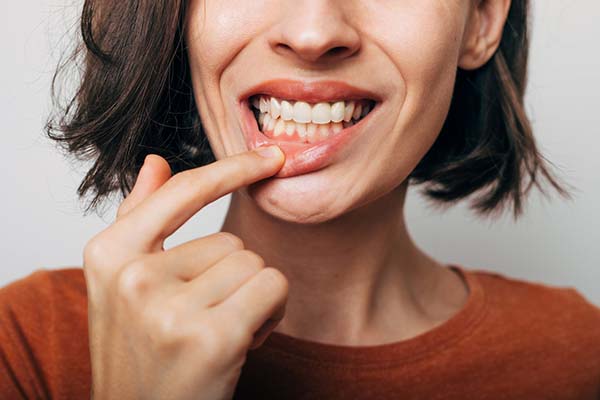3 Tips for Preventing Gum Disease

The CDC states that gum disease, also known as periodontal disease, is one of the leading oral infections in the United States. In addition, the National Institute of Health cites it as the most common culprit for adults losing teeth. Because the early stages of periodontal disease often do not have noticeable symptoms, many patients do not recognize this condition until it progresses to an advanced stage of periodontitis. Inflamed, painful, bleeding gums, bad breath, and loose teeth are all indicators of periodontitis.
Although gum disease left untreated can progress to become a devastating condition for affected individuals, it is largely preventable. Therefore, patients need to know what steps to take to avoid this chronic condition.
3 steps to protect against gum disease
Gum disease can be caused by a number of factors, including environmental, genetic, and medical issues. Patients can prevent periodontal disease by seeking routine dental care and being dedicated to oral hygiene. Patients with a family history of gum disease or a medical condition that can worsen the symptoms of periodontitis must be even more diligent about monitoring for this condition. Treatment for advanced periodontitis is much more invasive than early care, and the prognosis is not as positive as the disease progresses, so patients must be alert to the warning signs of this disease.
1. Practice good oral hygiene
Brushing one's teeth is not enough to prevent gum disease. Every patient needs a dedicated daily oral hygiene routine. This regimen should include brushing, flossing, and rinsing.
Ideally, patients should brush after every meal, but no less than twice a day. Finding a toothbrush of the correct size with appropriately strong bristles is very important. A dentist can recommend the right type of brush for the patient's age, size, and tooth condition. A professional dentist may also recommend that a patient use an electric toothbrush or water pick for more effective brushing and flossing.
For patients who have difficulty flossing thoroughly, interdental hygiene aids can help. Air and water flossers, interproximal brushes, and floss picks can motivate patients to clean between the teeth regularly. Patients must find a routine with which they can be consistent.
Mouthwash can be a valuable tool for daily oral hygiene measures. Patients should choose a rinse without alcohol, as this ingredient dries out the oral tissue. Mouthwash that includes antiplaque or antigingivitis ingredients will assist in eliminating oral bacteria. Fluoride is known to strengthen teeth, which is important in fighting against the effects of periodontitis. A prescription-strength rinse with an ingredient such as chlorhexidine can reduce redness, swelling, and bleeding of the gums.
2. Visit a dentist regularly
Dentists recommend that most adults have a dental checkup at least twice a year. During these visits, the dentist, hygienist, or assistant takes X-rays, cleans the patient's teeth, and diagnoses any oral conditions that may need treatment. Routine professional cleanings, known as dental prophylaxes, are essential for gum disease prevention.
For patients with gum disease, the dentist may recommend more frequent visits. Dental professionals call these appointments periodontal maintenance visits. At these appointments, the dentist evaluates the patient's gums and the bone level around the teeth. When a patient is visiting a dentist frequently, the dentist can identify any changes in oral health.
3. Treat gum inflammation early
Gingivitis is the earliest form of periodontal disease. Fortunately, this condition is treatable and early stages are even reversible. Bleeding and painful gums are often the first signs of this condition, although some people do not even notice any symptoms as their gums become affected. Hormonal changes caused by pregnancy, stress, and poor oral hygiene can all lead to gingivitis. Smoking, vaping, and recreational drug use can also create favorable conditions in the mouth for gingivitis to take hold.
When a dentist diagnoses gingivitis, a dental hygienist can help patients manage it. Dental hygiene instructions may include proper brushing, flossing, and rinsing techniques, with the recommendation of specially constructed equipment like soft-bristled or electric toothbrushes for gum sensitivity. Gingivitis leads to periodontitis if left untreated, which increases the risk of bone damage and tooth loss.
Conclusion
Although gum disease is prevalent in the United States, increased knowledge about this condition can lead to better outcomes and improved overall health. Preventive steps such as proper daily oral hygiene and regular dental visits with professional cleanings and thorough examinations can help to avoid gingivitis and even reverse it in its earliest stages. Patients wanting to achieve better dental health should contact a dentist to set up a consultation.
Request an appointment here: https://princewilliamdental.com or call Prince William Dental at (703) 662-8287 for an appointment in our Gainesville office.
Check out what others are saying about our dental services on Yelp: Gum Disease in Gainesville, VA.
Recent Posts
Gum disease is a serious condition that can result in a need for periodontal treatment. Treatment is needed in order to destroy the infection and prevent it from getting worse. Oftentimes, without treatment, a case of gum disease can become advanced, which can result in tooth loss, receding gums, and even jaw deterioration, all of…
One of the primary focuses of dentists is helping patients prevent gum disease. There are certain services, such as dental cleanings, that dentists can perform in the office to assist with gum disease prevention. However, most preventive care takes place at home between dental visits.To prevent gum disease, patients should implement a consistent oral care…
When it comes to oral health, the condition of the gums can be key. Proper brushing, flossing and the prevention of gingivitis can support good gum health; however, when individuals suffer from crooked teeth, an underbite or an overbite and choose to get braces, this may cause problems with the gingiva. Dental patients who want…
While examining the inside of the mouth is already a typical part of a regular dental check-up, for many people it is also worth scheduling an appointment for an oral cancer screening. The American Cancer Society predicts that more than 53,000 people will be diagnosed with oropharyngeal or oral cavity cancer in 2020, and together…


